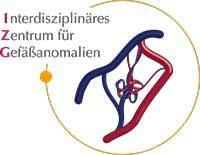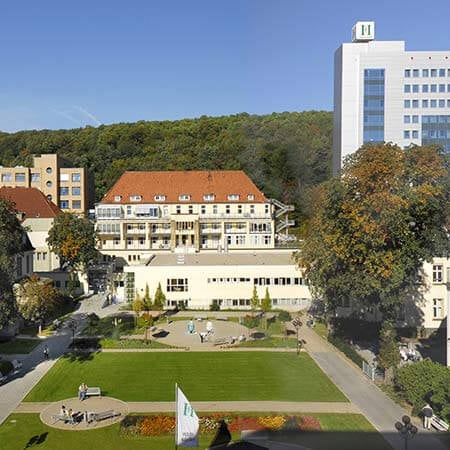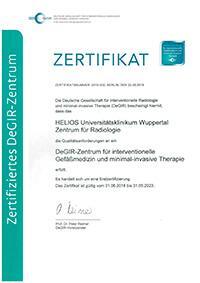Adrenal Cancer — Embolization or Chemoembolization: treatment in the Best Hospitals in the World
Treatment prices are regulated by national law of the corresponding countries, but can also include additional hospital coefficients. In order to receive the individual cost calculation, please send us the request and medical records.

Department of Interventional Radiology and Neuroradiology
The Department of Interventional Radiology and Neuroradiology offers a full range of advanced imaging diagnostics and minimally invasive treatments on both an inpatient and outpatient basis. The department has state-of-the-art medical equipment for imaging tests such as X-ray, computed tomography, magnetic resonance imaging, digital subtraction angiography, and mammography. The medical facility also performs many highly effective interventional therapeutic procedures under image guidance, which in many cases allow patients to avoid traumatic open surgery. For example, the department successfully performs local fibrinolysis, thrombectomy, percutaneous transluminal angioplasty, hemostasis, transarterial chemoembolization, uterine artery embolization, and other procedures. The department's neuroradiologists specialize in brain and spinal cord imaging and the treatment of central nervous system disorders. Interventional neuroradiology focuses on the treatment of carotid artery stenosis, brain aneurysms, arteriovenous malformations, dural fistulas, subdural hematomas, brain tumors, skull base and spinal tumors, and chronic back pain. The department's medical team has extensive clinical experience in their areas of expertise. The specialists are guided by the recommendations of the German Society for Interventional Radiology and Minimally Invasive Therapy (DeGIR) and the German Society for Neuroradiology (DGNR), which helps to achieve the best results.






Department of Adult and Pediatric Diagnostic, Interventional Radiology, Neuroradiology
The Department of Adult and Pediatric Diagnostic, Interventional Radiology, Neuroradiology is one of the best institutions of its kind in Germany and offers patients the full range of radiological studies and imaging-guided minimally invasive therapy. The department’s scope of tasks also includes imaging diagnostics in children of all age groups, detection and invasive treatment of cerebral vascular pathology (neuroradiology). Patient care is provided both on an inpatient and outpatient basis.







Department of Interventional Radiology
The Department of Interventional Radiology specializes in the full range of minimally invasive image-guided interventions for diagnostic and therapeutic purposes. Diagnostic interventional procedures allow obtaining tissue samples for further laboratory tests. Most minimally invasive interventional procedures are performed for the treatment of vascular obstruction or stenosis, as well as for tumor destruction. The surgeon inserts special catheters and/or probes through small skin punctures. All surgical procedures are performed under image guidance – X-ray, digital subtraction angiography, ultrasound, CT, MRI. The specialist can clearly see all the anatomical structures and a pathological focus, thanks to which he accurately controls the delivery of the catheter to the required site and all subsequent manipulations. It is worth noting that the department was awarded the quality certificate of the German Society for Interventional Radiology (DeGIR) in 2018, which guarantees effective treatment in accordance with modern medical standards. The department's doctors have the necessary skills and qualifications, which allow them to select the best treatment option for each patient and ensure its successful conduction.






The adrenal glands are glands that produce a number of hormones, including glucocorticoids, adrenaline, norepinephrine, and dopamine. The tumors that develop in this gland are very aggressive. Doctors try to treat them with surgery. To reduce complications and reduce the risk of recurrence, adrenal artery embolization may be performed prior to surgery. In advanced cancer stages, this procedure can be used to slow the growth of the tumor and suppress its metastases in the liver.
Content
- What are embolization and chemoembolization
- In what cases can embolization be performed for adrenal carcinoma
- How is the embolization of adrenal vessels performed
- Results of adrenal arterial embolization
- Embolization for advanced adrenal cancer
- Why it is worth treating adrenal carcinoma abroad
- Treatment in Europe with Booking Health at an affordable price
What are embolization and chemoembolization
Embolization is a treatment option for carcinoma, the essence of which is to close the arteries that feed the adrenal tumors. The procedure can be performed for different purposes, depending on the stage of the disease and additional cancer therapy options that will be used. If the tumor is resectable, then transarterial embolization is performed primarily to reduce blood loss and increase the likelihood of cancer cure.
In the advanced stages, embolization is usually used in combination with regional cytostatic therapy. This treatment option is called transarterial chemoembolization. It involves the introduction of chemotherapy drugs into the arterial network of the tumor. There are various options to use for chemoembolization. Most often, this is oily chemoembolization or the use of drug-eluting microspheres.
In what cases can embolization be performed for adrenal carcinoma
For patients with adrenal cancer, the only chance to cure the disease is with surgery. The cure is possible only at an early stage. The surgical procedure must be performed as quickly as possible because the tumor is rapidly progressing.
Prior to surgery, some patients undergo embolization of the vessels of the gland. After this procedure, cancer can be treated with surgery more safely and with a better chance of success. Complications are less common in patients. The risk of tumor recurrence after its removal is reduced.
In advanced cases, chemotherapy becomes the main treatment option. Occasionally, patients receive external beam radiation therapy – its effectiveness in adrenocortical carcinoma is low. European hospitals offer other treatment options: brachytherapy, immunotherapy, chemoembolization. With the help of embolization, doctors can suppress both the primary tumor in the adrenal glands and its metastases in the liver.
How is the embolization of adrenal vessels performed
The procedure is minimally invasive. It is usually performed through the femoral artery. There are also other options: through the brachial or radial artery in the arm. The doctor makes a small incision and inserts a catheter into the vessels. This is followed by a sequential catheterization of such arteries as aorta, renal and phrenic arteries.
The doctor will do an angiography to find out which vessels supply blood to the adrenal gland. He injects a contrast agent and takes a series of X-rays to understand where and through which vessels the blood is flowing. An accurate diagnosis is important not only for the effectiveness, but also for the safety of the procedure. The doctor should maximally impair the blood supply to the adrenal gland, but at the same time avoid getting the embolysate into non-target vessels, so as not to impair the blood supply to other organs.
Then superselective embolization of the arteries feeding the adrenal gland is performed. The doctor closes the vessels using particles of polyvinyl chloride, hemostatic sponges, alcohols, glue, spirals. After closing the lumen of the arteries, the blood supply to the adrenal gland deteriorates and part of the tumor dies. As a result, the operation to remove it may be more successful and safer.
Embolization of the adrenal arteries is often complemented by coagulation of the central vein. This manipulation involves closing its lumen by passing a high frequency electric current for 2-3 seconds. Thus, as a result of the endovascular procedure, the adrenal gland is virtually completely disconnected from the circulatory system.
Results of adrenal arterial embolization
Adrenal arterial embolization cannot cure cancer. This procedure is performed mainly prior to surgery. The patient usually does not undergo surgery on the first day or in the next few days after embolization.
The procedure can be performed for the following purposes:
- Reduced blood loss during surgery.
- Reduced risk of cancer cell dissemination along the peritoneum.
- Reduced likelihood of tumor recurrence after removal.
- Reduced risk of a catecholamine crisis associated with the ingress of large amounts of hormones into the blood vessels.
- Reduced risk of thromboembolic complications associated with the ingress of tumor fragments or blood clots into the arteries.
Both adrenal gland and tumor shrink after arterial embolization. During their removal, the likelihood of damage to the capsule decreases. In the process of surgical treatment of adrenal cancer, there is nothing more important than avoiding damage to the capsule, since in case of trauma, cancer cells enter the abdominal cavity and adrenal carcinoma recurs in almost 100% of cases.
Since the vessels are blocked, blood loss during surgery is minimal. The vast majority of patients do not need hemotransfusion (blood transfusion). They feel better after surgery.
Some adrenal malignant tumors are hormone-producing. It is important that hormones do not enter the bloodstream in large quantities, as this will lead to serious hemodynamic disturbances, up to death. Closing the lumen of the blood vessels before surgery reduces the risk of such complications to almost zero.
Embolization for advanced adrenal cancer
In the advanced stages of adrenal carcinoma, the disease cannot be cured, but it can be controlled. Doctors use chemoembolization of the vessels of the adrenal glands. If liver metastases appear, they will be suppressed by hepatic artery chemoembolization.
Embolization is combined with regional chemotherapy. Doctors use cytostatics to destroy cancer cells. For the closure of tumor vessels, drug-eluting microspheres are mainly used. These are tiny balls saturated with chemotherapy drugs. They irreversibly close the arteries feeding the tumor and release chemotherapy drugs for a long time, damaging the carcinoma with high doses of cytostatics.
With the development of metastases in the liver, a similar procedure is carried out: doctors inject microspheres or a fat emulsion of lipiodol with chemotherapy drugs into the branches of the hepatic artery. Emboli clog the arteries of the liver, resulting in a rapid shrinkage of the metastatic tumor. In this case, liver function is not significantly affected. This is due to the fact that the healthy parenchyma receives most of the blood from the portal vein, while metastases of carcinoma 90% feed from the hepatic artery.
Why it is worth treating adrenal carcinoma abroad
Adrenal carcinoma is a very aggressive tumor that grows rapidly and metastasizes early. If you are treated by the best doctors in the world, you can expect good results, up to a complete cure for cancer. In the fight against adrenal carcinoma, the timing of the start of treatment is very important. The earlier the operation is performed, the more chances of success. The Booking Health specialists will help you organize your trip abroad. We will find a suitable hospital for you that will be ready to admit you for treatment in the coming days.
There are several reasons for you to undergo adrenal artery embolization abroad:
- Highly accurate diagnostics to perfectly assess the blood supply to the adrenal gland and carcinoma in order to successfully complete the embolization procedure.
- Extensive experience with this type of treatment.
- Protection of non-target vessels from the ingress of embolysate reduces the risk of complications.
- European doctors combine arterial embolization with central vein coagulation to completely disconnect the adrenal glands from the circulatory system before surgery.
- Immediately after embolization, surgery is performed to remove the tumor – with minimal blood loss, a low risk of complications and a high chance of curing adrenocortical cancer.
- In advanced stages of cancer, chemoembolization is performed to suppress the primary tumor and liver metastases.
- Doctors successfully combine chemoembolization with other treatment options: chemotherapy, immunotherapy, brachytherapy.
Treatment in Europe with Booking Health at an affordable price
To undergo treatment in one of the European hospitals, please use the services of the Booking Health company. On our website, you can clarify the cost of treatment in different hospitals, compare prices and book a medical care program at a favorable price. Embolization of adrenal arteries in European hospitals will be easier and faster for you, and the cost of treatment will be lower.
Please leave your request on our website. Our employee will contact you and advise you about treatment in Europe. Booking Health will take care of the organization of your trip. We will provide the following benefits for you:
- We will select a hospital for treatment in Europe, whose doctors specialize in transcatheter chemoembolization.
- We will help you overcome the language barrier, establish communication with your attending physician.
- We will reduce the waiting time for the start of the medical care program and book a doctor's appointment on the most suitable dates.
- We will reduce the price. The cost of treatment in European hospitals will be lower due to the lack of coefficients for foreign patients.
- We will take care of all organizational issues: documents for entering the country, transfer from the airport, hotel, interpreting services, etc.
- We will prepare a program and translate medical documents. You do not have to repeat the previously performed diagnostic procedures.
- We will provide communication with the hospital after treatment in Europe.
- We will organize additional diagnostic examinations and treatment in European hospitals, if necessary.
- We will buy medicines abroad and forward them to your native country.
- We will help you keep in touch with the hospital and the doctor after treatment in Europe.
You will be treated by the best doctors in the world. The Booking Health employees will help reduce the cost of treatment and take care of all organizational issues, and you will only have to focus on restoring your health.
Authors: Dr. Nadezhda Ivanisova, Dr. Sergey Pashchenko

